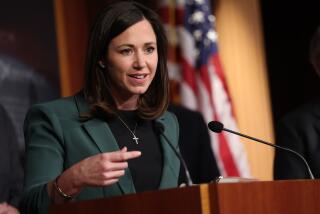Mitt Romney has girl trouble
This post has been corrected as indicated below.
You’d think a handsome guy like Mitt Romney would not have a problem with the ladies, but his poll numbers show something different. In the 12 swing states that will determine whether he goes to the White House as president or back to one of his many houses as a private citizen, Romney trails President Obama among female voters by a margin of 54% to 36%.
Female voters have flocked to the president in the days since contraception popped up as an issue in the campaign. Once Romney announced he opposed new federal rules that would require employers to cover birth control in healthcare plans and said he would withdraw government funding from Planned Parenthood, his numbers tanked among females. It did not help that the news has also been dominated by Republican efforts in many states to curtail abortion rights and by Rush Limbaugh’s misogynistic three-day tirade against a young, female Georgetown University law student who spoke up for contraceptive coverage in insurance plans.
A few days ago, Romney was caught without an answer during a media Q and A in which he was asked if he supported the Lily Ledbetter Fair Pay Act that enhances the ability of women to sue to gain equal pay for equal work. It was the first bill Obama signed into law when he became president. A day later, the Romney camp announced their candidate would not try to repeal the law — a rather tepid endorsement — but undercut even that position by trotting out two female Republican members of Congress to defend Romney on the issue. It turned out both had voted against the legislation.
Fairly or not, a lot of women have begun to suspect Republicans are eager to turn back the clock and take away some very personal prerogatives to which they have grown accustomed.
Democrats, of course, have exploited this by proclaiming that Republicans are conducting a “war on women.” This has inspired some amusing political contortions as the parties have vied for an advantage. Republicans put on their patriot hats and said that by using the word “war” in this context, Democrats were demeaning America’s heroic men and women in uniform who are engaged in a real war. Then, when a Democratic campaign consultant took a cheap shot at Mitt’s wife, Ann, by saying the mother of five children had never worked a day in her life, Republicans took umbrage, blasting Democrats for waging — yes — a “war” on women.
Romney’s campaign has tried to spin this debate toward economic concerns by pointing out how women in the job market have been hit disproportionately hard in the last three years (without pointing out men had already lost far more jobs in the waning days of the Bush administration). South Carolina’s female governor, Republican Nikki Haley, attempted to press this point in a TV interview, insisting that what women really care about is the state of the economy. Unfortunately, she prefaced her comments by saying women do not care about contraception. It’s probably not what she meant to say, but a gaffe is a gaffe and this did not help the GOP cause.
And it just keeps getting more awkward. Senate Minority Leader Mitch McConnell said on a radio show that the Democrats’ war on women spiel is bogus. “Talk about a manufactured issue,” he said. “There is no issue.” McConnell said female Republican senators would be the first to say “we don’t see any evidence of this.” Of course, someone had to go and ask a female Republican senator, Alaska’s Lisa Murkowski, and she said, “If you don’t feel this is an attack, you need to go home and talk to your wife and your daughters.” As Rick Perry would say, “Oops.”
Meanwhile, two other female GOP senators, Maine’s Olympia Snowe and Kay Bailey Hutchison of Texas, were already on record defending Planned Parenthood and access to contraceptives.
Romney has a lot of ground to make up with women voters and he’s not getting much help from his fellow Republicans. Still, the news is not all bad for Mitt. The USA Today/Gallup poll shows he has a commanding lead -- 56% to 38% -- among men over 50. That means he has a great chance of winning the votes of Mitch McConnell and the members of the Senate Republican caucus.
Well, the men, at least.
[For the Record, April 13: An earlier version of this post incorrectly referred to Mitch McConnell as Senate majority leader.]
More to Read
A cure for the common opinion
Get thought-provoking perspectives with our weekly newsletter.
You may occasionally receive promotional content from the Los Angeles Times.







